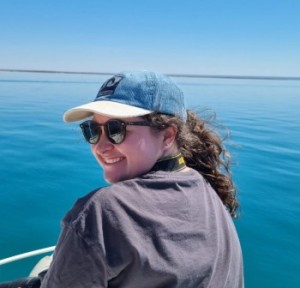
Isabella M. Reeves is a PhD Candidate in evolutionary ecology based at Flinders University. Her thesis works focuses on using genomic and biochemical tools to understand how the evolution of populations has affected their behaviour and ecology, with a focus on killer whales.
In 2023, Isabella published “Ancestry testing of “Old Tom,” a killer whale central to mutualistic interactions with human whalers” in the Journal of Heredity. This manuscript explores the history of a unique family of killer whales from Eden, New South Wales, Australia. They were recorded for almost a century to cooperatively hunt baleen whales with local whalers. By 1928, whaling operations had ceased, and killer whale sightings became scarce. A killer whale from the group, known as “Old Tom,” washed up dead in 1930 and his skeleton was preserved. How these killer whales from Eden relate to other populations globally and whether their genetic descendants persist today remain unknown. To address this, we used an interdisciplinary approach combining ancient DNA techniques, historical records, and First Nation oral history to provide novel insights into the origin and fate of the killer whales of Eden. Our findings highlight that this relationship is thought to pre-date European colonization by millennia, beginning with the Thaua people of Eden. Old Tom's genomic sequences were compared globally to killer whales, showing a common ancestor with killer whales from Australasia, the North Atlantic, and the North Pacific. He had the highest genetic similarity with New Zealand killer whales, however, most of his genetic variation was not shared with these widespread populations, suggesting possible local extinction. This study rectifies discrepancies in local records and provides new insight into the killer whales in Eden and the history of Australasian killer whales.

Check out our Editor's Choice article by Zimmerman et al., examining the great plains bison at American Prarie, while our cover this issue is courtesy of Winter et al., who lay out the best assembly yet of the beautiful Ural owl
AGA member have elected a new President and Councilors.
Jeff Good
Katie Lotterhos
Al Roca
Christine Edwards
Klaus-Peter Koepfli
Michael Russello
Nevé Baker
Apply now for an AGA
Any questions? Contact the Managing Editor at theaga@theaga.org.